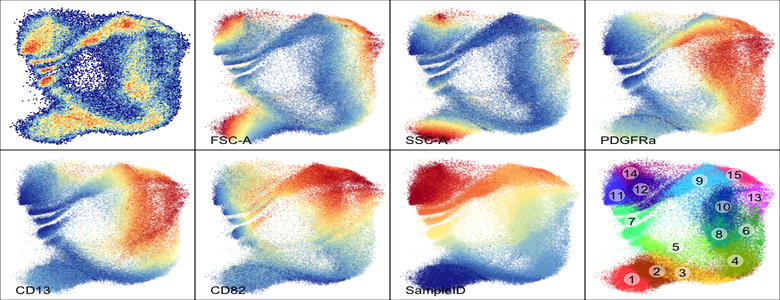
The course takes place in B3 on Fridays at 14:50-16:20 plus four practical lessons on each 3rd week at 16:30 to 19:00.
You will be guided through the basic classification of cytometric methods in their historical context. Technological advantages and disadvantages of individual branches of cytometry will be documented using applications from various fields of science: botany, microbiology, protistology, hydrobiology, molecular biology, genetics, immunology and biomedicine.
Practical training is an integral part of this course and it is organized in 4 modules (3 hours each):
- Basic data analysis
- Experiment design
- Sample preparation and measurement of multi-parametric data
- Advanced data analysis
Applications of cytometry cover wide range of experimental approaches: analysis and sorting of particles of different sizes from sub-micron (chromosomes, bacteria, organelles, vesicles, exosomes) through cells (up to hundreds of micrometers) up to whole organisms of 1mm size. Analysis is not limited to static single parameter - univariate tests, but the main power of cytometry lies in multi-parametric analysis of heterogeneous samples and their functional properties. Therefore, cytometry is an essential building block of systems biology.
Due to development and introduction of novel fluorochromes, including variants of fluorescent proteins, it is now possible to study single cell function down to the level of protein-protein interactions.
Cytometry instruments as well as cytometry data are highly complex, fully standardized, and allow the use of robust statistical methods for their analysis. The course contains practical demonstration and detailed exercise in data analysis.
The main emphasis is on flow cytometry. Other variants, including image cytometry, are covered theoretically but are not part of the practical exercise.
After completing the course you will have:
- Knowledge of principles of cytometry
- Knowledge of cytometry instrumentation and the use of fluorochromes and probes
- Knowledge of current applications in cytometry in the wide range of scientific fields
- Ability to assess the suitability of selected method in solving a specific problem or a question
- Ability to analyze and interpret results generated by flow cytometry
- Ability to critically assess the quality of cytometry data in the scientific publications
- Teacher: Karel Drbal